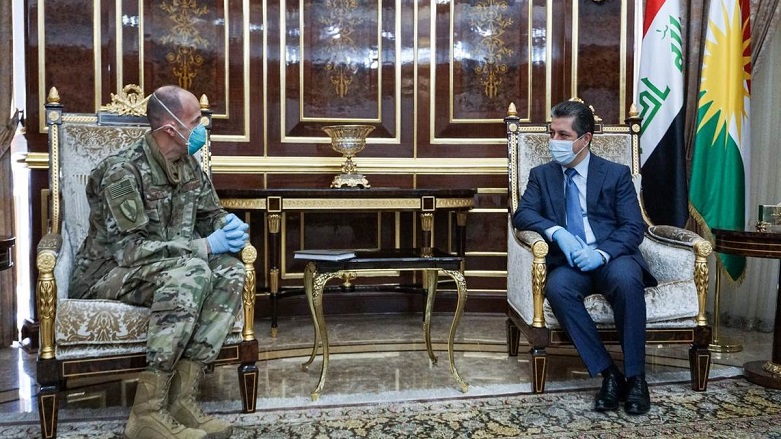PM Masrour Barzani meets US senior defense official in Iraq

ERBIL (Kurdistan 24) – On Tuesday, Kurdistan Regional Government (KRG) Prime Minister Masrour Barzani met with Brig. Gen. Ernest J. Teichert III, US senior defense official and defense attaché-Iraq, US Embassy, in Baghdad, to discuss Iraq’s situation and the importance of military coordination between Peshmerga forces and the Iraqi army.
In the meeting, the senior defense official “reiterated” the continued US assistance to the Peshmerga forces as it has played an “important role” in combating terrorism in the region, a statement the prime minister’s office released read.
Brigadier General Teichert “praised” the KRG’s reform efforts, particularly at the Ministry of Peshmerga, the statement mentioned.
“The Kurdistan Region is a strategic and important ally of the US in the region,” the US General added, according to the statement.
For his part, the KRG prime minister “expressed his concerns regarding the instability in the Kurdistani areas outside the Kurdistan Region,” the statement relayed, as he “stressed on the reactivation of the joint security mechanism between the Iraqi army and Peshmerga forces” as it paves the ground for restoring stability to those areas.
In recent months, the so-called Islamic State has increased its activities across the country, most notably in disputed territories between the Kurdistan Region and Federal Government of Iraq, targeting and killing dozens of civilians and members of the security forces.
Top Kurdistan Region officials and Peshmerga commanders have issued repeated warnings to both the Iraqi government and the international community that the Islamic State remains active and capable of reasserting itself and re-emerging in the disputed territories to continue its campaign of violence.
A “security vacuum,” as Kurdish officials have described it, has made the disputed areas in Diyala, Salahuddin, and Kirkuk more vulnerable to Islamic State attacks.
Editing by Karzan Sulaivany
